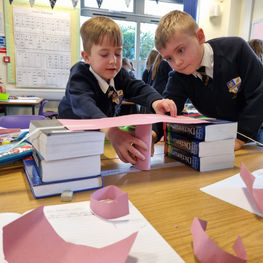
Nauka
Intent
At The Grange, the science curriculum is designed to develop pupils’ curiosity about the natural world, deepen their scientific understanding and equip them with the knowledge and skills to ask questions, investigate and explain scientific phenomena. We aim to nurture children’s innate inquisitiveness and enable them to develop a range of scientific skills that are useful across the whole curriculum.
The curriculum is knowledge-rich and carefully sequenced, enabling pupils to:
-
Develop secure understanding across biology, chemistry and physics
-
Build and apply key scientific vocabulary and concepts
-
Understand the relevance of science in everyday life and the wider world
-
Work scientifically with increasing independence and accuracy
Science supports pupils in becoming curious, critical thinkers who value evidence and understand their responsibility for the world around them, reflecting The Grange Way.
Implementation
Science is taught through well-structured units that build progressively from EYFS to Year 6. Pupils learn through interactive, engaging activities and scientific resources that support conceptual understanding and enquiry.
-
Learning is sequenced so pupils build knowledge over time and connect new learning to prior understanding
-
Pupils encounter age-appropriate content and technical vocabulary that enables them to discuss, investigate and evaluate phenomena.
-
PLAN (Association of Science Education) is used as a foundation for planning and assessment, giving teachers a clear framework for National Curriculum coverage.
-
TAPS (‘Why and How’ from Bath Spa University) supports focused activities and assessment of ‘working scientifically’ progression throughout the school.
-
Science is taught as a minimum fortnightly and mainly weekly subject, allowing regular practice and deep learning.
Working Scientifically is embedded throughout the curriculum, with pupils developing skills in:
-
Asking scientific questions
-
Planning and carrying out fair tests
-
Observing, measuring and recording data
-
Drawing conclusions and evaluating evidence
Teaching is adapted so all pupils, including those with SEND and disadvantaged pupils, can access the curriculum and achieve well.
Cross-Curricular Links (Science)
Science at The Grange is purposefully connected to wider curriculum learning, enabling pupils to apply transferable skills while maintaining scientific integrity. Links include:
-
Reading – scientific texts develop vocabulary and comprehension of technical information
-
Writing – explanations, reports and evaluative writing in science strengthen literacy
-
Mathematics – measurement, data handling, graphs and statistics support scientific enquiry
-
Geography – links through environmental science, habitats and climate
-
Computing – digital tools support data collection, modelling and representation
-
PSHE – links with health, wellbeing and lifestyle choices
These planned links ensure learning is meaningful, relevant and transferable across the curriculum while preserving science as a discrete discipline.
Enrichment Opportunities
The science curriculum is enriched through a variety of activities, including:
-
Online resources (Purple Mash, BBC Bitesize science)
-
Visits to scientific venues and exhibitions
-
Themed events such as Science Under the Stars
-
Science books linked to English study and reading areas
-
Visits to external providers (e.g., Futures for Years 5 and 6)
Impact
By the end of each key stage, pupils:
-
Demonstrate secure scientific knowledge and vocabulary
-
Apply scientific enquiry skills confidently and accurately
-
Use evidence to explain and justify conclusions
-
Show curiosity, resilience and confidence in scientific thinking
Children progress to secondary school with enthusiasm to explore the world and are equipped with foundational skills for future scientific study and STEAM-related careers.
Behaviour and Attitudes (Science)
Pupils show positive attitudes to science. They engage enthusiastically in practical work, collaborate effectively, follow safety procedures responsibly and persevere when investigations are challenging.
Personal Development and Science
Science contributes to pupils’ personal development by:
-
Encouraging curiosity and critical thinking
-
Supporting environmental awareness and responsibility
-
Developing confidence, independence and teamwork
Leadership and Management (Science)
Science is led effectively to ensure clear progression, consistent expectations and high-quality teaching. Subject leadership monitors coverage, progression and impact so that pupils know more and remember more over time. Professional development supports teachers in delivering science with confidence.


























